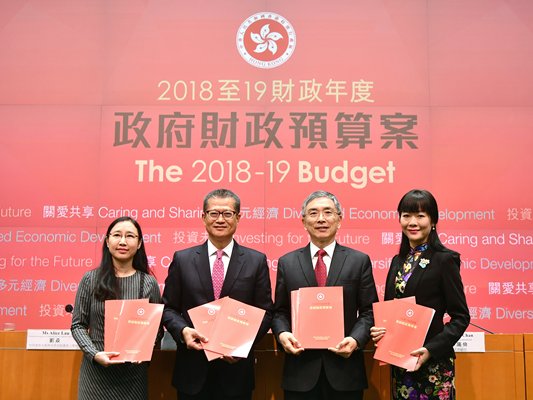Balance Struck In Surplus Allocation

The Government has struck a balance in using its $138 billion surplus for 2017-18, Financial Secretary Paul Chan says.
Elaborating on the initiatives in his 2018-19 Budget in a press conference today, Mr Chan said he has considered the external economic environment, domestic economic situation and public aspirations in planning how to spend the surplus.
"Between sharing the surplus in the form of cash handout(s) and using those surplus to improve and enhance our service as well as investing into the future, we need to strike a balance.
"This year, we use about close to 40% of the surplus in the form of one-off relief, namely salaries tax rebate, profits tax rebate, rates rebate, two-month extra payment to social security recipients.
"We do believe when we hand out cash, when we try to share the fruits of economic success, these have to be targeted instead of across-the-board distribution. This is our belief and our principle."
To reduce the burden on taxpayers, the Budget proposed to raise the bandwidth and inserted one more band with reduced applicable marginal rate for salaries tax.
When asked if salaries tax should be further cut, Mr Chan said significant measures have already been taken.
"We also introduced quite a number of new deductions, for example the healthcare insurance scheme deductions. We are also exploring the possibility of allowing additional deductions for MPF contributions.
"We would rather prefer to do this on a measured manner although it is already a bold step forward. We can supplement that by way of one-off tax rebate."
Mr Chan added the Government will not yet relax its property cooling measures to avoid pushing prices up and will continue to closely monitor the situation.
In a televised panel discussion on his Budget tonight, Mr Chan said in the past 10 years government revenue was about 21% of the city's Gross Domestic Product, while public expenditure was kept below 20% of GDP, resulting in a certain amount of surplus.
He said there is room to lift the budgetary criterion that public expenditure should be kept at or below 20% of GDP.
The Government will increase expenditure in many areas, such as education, healthcare, and land supply and housing in the coming five years.
He estimated public expenditure will be slightly higher than 21% of GDP in the coming years.
US Stocks Rise On Hopes Of Pause In Rate Increases
Wall Street stocks finished solidly higher on Thursday, reflecting better sentiment on the US economy and a consensus vi... Read more
China's Financial Risks 'controllable': Regulators
The head of the National Financial Regulatory Administration on Thursday told a high-profile forum in Shanghai that the ... Read more
Banks Cut Yuan Deposit Rates, Could Boost Consumption
China's biggest banks on Thursday said they have lowered interest rates on yuan deposits, in actions that could ease pre... Read more
Cheese And Wine Put EU, Australia Deal In Peril
Australia on Thursday threatened to walk away from a blockbuster free trade deal with the European Union unless its prod... Read more
US Stocks End Mixed As Tech Shares Are Sold Off
Gains by industrial companies lifted the Dow on Wednesday, while weakness among technology shares pushed the Nasdaq deci... Read more
Amazon 'plans Prime Video Streaming Service With Ads'
Amazon.com is planning to launch an advertising-supported tier of its Prime Video streaming service, the Wall Street Jou... Read more

